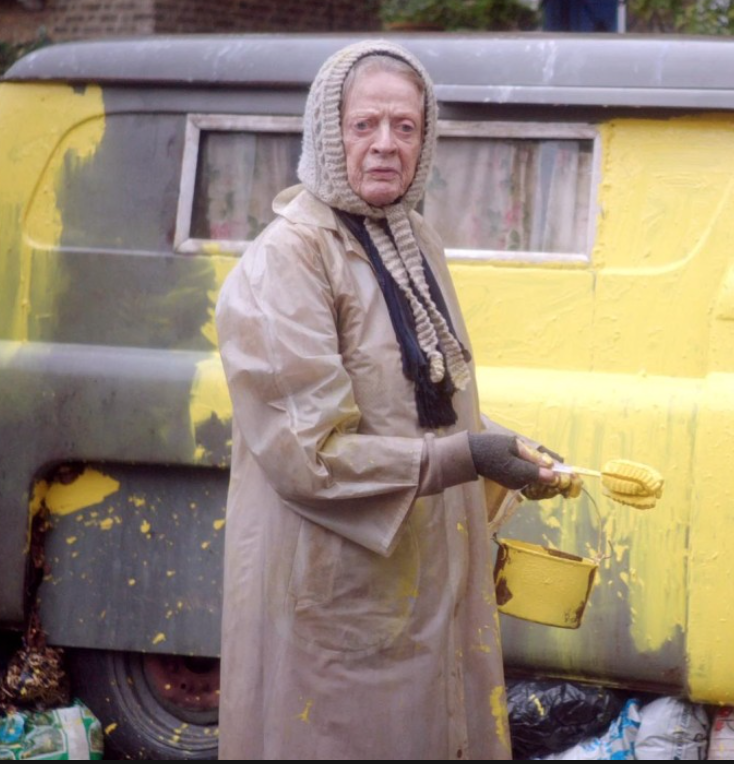 Set in mid-century London, “The Lady in the Van” douses us with sweeping orchestration – all tooting clarinets that sound twee as only clarinets can sound. But while “twee” could have been the operative term across the board in this period drama starring Dame Maggie Smith, audiences expecting a “Best Exotic Marigold” homage to the Endearing Habits of Elders will not be sated. This is an adaptation of Alan Bennett’s eponymous memoir and subsequent stage production, and the essayist and playwright (who also serves as screenwriter here) has a long-established habit of buttering us up with metaphorical tea and crumpets only to lay in stark realities about human intimacy and obfuscation.
Set in mid-century London, “The Lady in the Van” douses us with sweeping orchestration – all tooting clarinets that sound twee as only clarinets can sound. But while “twee” could have been the operative term across the board in this period drama starring Dame Maggie Smith, audiences expecting a “Best Exotic Marigold” homage to the Endearing Habits of Elders will not be sated. This is an adaptation of Alan Bennett’s eponymous memoir and subsequent stage production, and the essayist and playwright (who also serves as screenwriter here) has a long-established habit of buttering us up with metaphorical tea and crumpets only to lay in stark realities about human intimacy and obfuscation.
Bennett has not one but two stand-ins here, both played by Alex Jennings. “Writing is talking to oneself,” he informs us early on, and so he divides into a “writing self” and a “living self,” the latter lacking the dark acuity of the former. (They share a predilection for sweater vests and bowties.) It’s a dissociation that Mary Shepherd (Smith), the titular lady in the van, seizes upon while feigning a very useful balminess. A mysterious homeless woman who first encamped on Bennett’s Camden Town block in the mid-1970s, Miss Shepherd (as he unfailingly calls her) spends her time praying, selling pencils, decorating her “crushed mimosa”-painted vehicle with pictures of the Queen, and deflecting the efforts of nouveau-riche locals to assuage their liberal guilt. “No thank you,” she airily tells one woman who offers her a home-baked dessert. “Pears repeat on me.”
 Bodily functions are key to this tale. We first meet Bennett when he is describing Miss Shepherd’s odor in a piece he is writing about her. “Sweet with a touch of urine,” he pronounces in lacquered tones as she trudges out of his loo into the van she’s kept parked in his driveway since he invited her to do so 15 years ago, when authorities demanded she vacate the street. It’s an offer he believes she craftily set him up to make – and one she only accepted as if she were doing him a favor. “I’m not a saint, just lazy,” he tells one bystander who applauds his kindness. It sounds like another deflection but he’s right. That unwillingness to confront others is often mistaken for niceness, which is a conflation Bennett explores at length while tripping over the bags of excretion that Miss Shepherd piles on his property.
Bodily functions are key to this tale. We first meet Bennett when he is describing Miss Shepherd’s odor in a piece he is writing about her. “Sweet with a touch of urine,” he pronounces in lacquered tones as she trudges out of his loo into the van she’s kept parked in his driveway since he invited her to do so 15 years ago, when authorities demanded she vacate the street. It’s an offer he believes she craftily set him up to make – and one she only accepted as if she were doing him a favor. “I’m not a saint, just lazy,” he tells one bystander who applauds his kindness. It sounds like another deflection but he’s right. That unwillingness to confront others is often mistaken for niceness, which is a conflation Bennett explores at length while tripping over the bags of excretion that Miss Shepherd piles on his property.
“Caring is about shit,” he declares with less acceptance than you’d imagine; beneath that mild manner, he’s as much of a handful as Shepherd herself. It’s no coincidence that his uneasy truce with the older woman is one of the most consistent and longest-lasting relationships of his life. He keeps everyone less aggressive at arm’s length, and the irony that he allows her to perch on his property while he stows his mother, who is the same age, in a distant retirement home crops up again and again. But in depictions of neighbors and colleagues, Bennett’s Writer Self is careful to implicate others as cold fish as well. When he says, “Miss Shepherd remained on the edge of my life for so long that she became not incidental at all,” he could be describing the brutal casualty of most human relationships, which is one of this film’s many truths that tug at us later.
 Though the antecedent play very well might be, “The Lady in the Van” is still no grand revelation. Jennings doesn’t seem as comfortable as he might be acting against himself (clearly, he needs “Orphan Black” bootcamp), and Nicholas Hytner’s direction suds up Bennett’s dry-eyed observations. One image of the playwright gleefully racing a wheelchair-bound Shepherd especially teeters into the soggy turf that his screenplay sidesteps. But Smith is wonderful here. Wrapped in layers of stained jackets and scarves, her eyes looming out of hoods knitted by hapless do-gooders (read: marks), you get the feeling that she is a nine-year-old gleefully imitating an old person. That sense of playacting is how this film worms past our expectations and defenses. She and Bennett play pretend with each other as well as themselves: she’s running from a tragedy in her past, he’s wedged deep in the closet. Ah, well. Who isn’t playacting all the time, really? What works best about this adaptation is its insistent reminder that no one’s shit smells like roses.
Though the antecedent play very well might be, “The Lady in the Van” is still no grand revelation. Jennings doesn’t seem as comfortable as he might be acting against himself (clearly, he needs “Orphan Black” bootcamp), and Nicholas Hytner’s direction suds up Bennett’s dry-eyed observations. One image of the playwright gleefully racing a wheelchair-bound Shepherd especially teeters into the soggy turf that his screenplay sidesteps. But Smith is wonderful here. Wrapped in layers of stained jackets and scarves, her eyes looming out of hoods knitted by hapless do-gooders (read: marks), you get the feeling that she is a nine-year-old gleefully imitating an old person. That sense of playacting is how this film worms past our expectations and defenses. She and Bennett play pretend with each other as well as themselves: she’s running from a tragedy in her past, he’s wedged deep in the closet. Ah, well. Who isn’t playacting all the time, really? What works best about this adaptation is its insistent reminder that no one’s shit smells like roses.
This was originally published in Word and Film.
